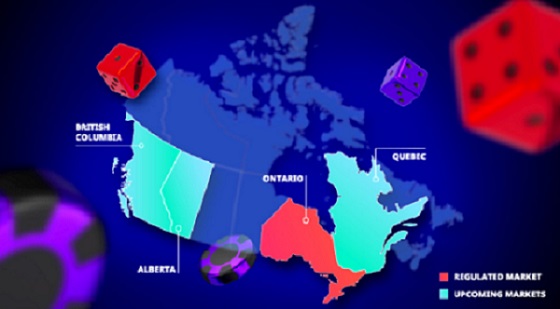Also Interesting
Casino market in Canada grows in 2023 as more states consider legalization of igaming

The year 2023 marked a significant turning point for the Canadian casino industry. Ontario, the country’s most populous province, took a bold step by legalizing and regulating online gambling within its borders. This decision, met with anticipation by both the public and gambling operators, has demonstrably revitalized Ontario’s casino market and sparked discussions about similar moves across Canada.
Prior to 2023, online gambling in Canada existed in a legal grey area. While federal law prohibited the operation of online casinos by domestic entities, Canadians were free to access offshore websites that were offering various virtual slot machines, table games like blackjack or roulette and sports betting. This presented a challenge for regulators. Not only were they unable to capture tax revenue from this activity, but they also lacked control over consumer protection measures and responsible gambling initiatives.
Ontario’s decision to legalize online gambling addressed these concerns head-on. The province established a regulated online gaming market, allowing licensed operators to offer casino games, sports betting, and other forms of online gambling to residents. This move not only provided a safe and secure environment for players but also opened up a new avenue for tax generation.
The impact of Ontario’s online gambling legalization has been undeniable. Since its launch in April 2023, the market has experienced explosive growth. Gross gaming revenue (GGR) from online gambling platforms has surpassed initial projections, with analysts attributing this success to a combination of factors. Firstly, the convenience and accessibility of online gambling have attracted new customers who may not have frequented traditional brick-and-mortar casinos. Secondly, the variety and innovation offered by online platforms – with their extensive game libraries, live dealer experiences, and mobile compatibility – have proven highly appealing to existing gambling enthusiasts.
The economic benefits for Ontario have been substantial. Tax revenue generated from online gambling is already exceeding estimates, providing a significant boost to provincial coffers. These funds are being directed towards various government initiatives, from infrastructure development to social programs. This tangible financial success has not gone unnoticed by other provinces across Canada.
Several provinces, including British Columbia, Alberta, and Manitoba, are actively considering following Ontario’s lead and legalizing online gambling within their own jurisdictions. These provinces are closely monitoring Ontario’s experience, with a keen eye on the regulatory framework, tax revenue generation, and potential social impacts.
Proponents of online gambling legalization argue that the benefits extend beyond just tax revenue. A regulated market allows for stricter controls on advertising, responsible gambling measures, and player protection. Additionally, it fosters competition within the industry, potentially leading to better odds and a wider variety of games for consumers.
Opponents, however, raise concerns about potential increases in problem gambling rates and the social costs associated with it. They argue that the ease of access and anonymity offered by online platforms could exacerbate gambling addiction. Additionally, the potential for increased advertising and marketing associated with a legal online gambling market raises concerns about the normalization of gambling behavior.
Despite these concerns, the success of Ontario’s online gambling legalization has undoubtedly reignited the conversation across Canada. As other provinces weigh the potential benefits and drawbacks, it seems likely that online gambling will become a more prominent feature of the Canadian casino market in the near future. The key will be striking a balance between generating revenue, protecting consumers, and mitigating potential social harms. By learning from Ontario’s experience and implementing a robust regulatory framework, other provinces can pave the way for a safe, responsible, and prosperous online gambling market in Canada.
Also Interesting
If You Frequently Travel, A Second Phone Number Can Be A Cost Effective Solution

Advances in transport technology have reduced not only travel times but also costs. Airlines and tour companies offer a wide array of cut-price deals, so if you already have a destination in mind, sign up for email alerts. Today, you can fly from Canada to Europe in around 6 hours, whereas decades ago, the same journey took weeks by boat. Maybe you travel to represent your organization for work-related purposes. In that case, you get to combine business and leisure, so you’ll return to the office refreshed and ready to be productive.
Suppose you’re an international traveler, a savvy vacationer, or even a local adventurer. In that case, you know a few trips make your trip easier: a passport, comfy shoes, and a six-port USB charger. And it doesn’t take long to realize there’s one thing you’ve forgotten. You need an eSIM Canada for enhanced privacy protection, streamlined communications, and the ability to avoid expensive roaming charges. You probably have an expensive Android or iPhone device, so the last thing you want is another handset. There are many ways to add an extra phone number that works with your smartphone.
Get And Setup An eSIM, Which Works Like A Physical SIM Card
eSIM technology offers a seamless, more integrated approach to connectivity, so it’s a progress from traditional SIM cards. By enabling the eSIM profile, you get access to the operator’s network, which is optimized for local access and helps avoid potential roaming restrictions. This level of resiliency is convenient for specific use cases, such as Google Maps, that require automatic initial connectivity. I you’re traveling, it’s recommended to install the eSIM a couple of hours before your trip or once you’ve reached your destination. The validity period starts counting. You’ll need a WiFi or data connection to set up the eSIM on your device.
You can manually activate the eSIM by pasting the installation code (and any other required information) if you don’t have another device to scan. You should activate the eSIM as soon as you arrive at our destination to prevent your mobile phone data from being used. Activating roaming or data roaming from your device will activate the plan. You can install the eSIM by scanning the QR code you received from the provider: open the built-in camera app, point the camera at the QR code, and tap the banner that appears on your phone. Label the eSIM and set your preferences for calls, messages, and data.
Not Only Do You Get To Keep Your Phone, But You Can Also Add A New Number
An additional phone number allows you to distinguish between personal and professional calls and messages, fostering a healthier work-life balance, and adds another layer of anonymity when interacting with strangers. Work, friends, family, and dating contacts are entirely separate. Texting is unlimited, calling works with your carrier within minutes, and voicemail is easy to customize. You can talk and text using any phone number at any time. The second line might be a disposable or semipermanent number. When traveling overseas, you’ll need to provide your phone number to hotels, bicycle-sharing services, and so on.
Having a phone that works just like it does back home when traveling abroad is the best thing you can do to reduce stress. Being able to keep in touch with family and friends, using Google Translate, and having access to booking sites in the event of delays are just some of the reasons why Internet access is indispensable. Get a full-featured number that supports limitless Internet so you can use apps like WhatsApp, Facebook Messenger, or Skype. It’s not a good idea to use image-heavy social media apps like Snapchat or Instagram.
How To Get The Best Performance Out Of Your Esim When Traveling
Some smartphones have both a removable SIM card and an eSIM card, which allow users to have two separate numbers – i.e., a personal number and a work number – on one device. After establishing a connection to a mobile network, your eSIM will be functional and ready for immediate use. Using a local mobile network while overseas is more affordable than paying roaming costs to your home network; should you mistakenly erase your eSIM, you must reach out to your provider and ask for another installation code. Some device manufacturers offer instructions on how to use plans from two different providers.
In what follows, we’ll present our favorite tips on how to make the most of your eSIM when traveling abroad:
● Strategically plan your data usage: Review your plan details before jetting off. Understanding what your eSIM package includes will help you prepare for your trip and stay connected while miles away.
● Give your eSIM a custom name: During the eSIM installation, you can label your new SIM. For instance, you can name the eSIM “Travel” or “Canada eSIM” and your existing physical SIM “Personal”. If you change your mind, you can edit them at any time.
● Turn on push notifications: You can turn on push notifications to be informed if data is running low or your eSIM is about to expire. You can stay focused without constant interruptions.
In Closing
If you’re traveling internationally, having a second phone number can offer several advantages, such as security, privacy, and convenience. It can be used for bookings, online registrations, and transactions, therefore minimizing the risk of your primary number being exposed to scams and other types of cyberattacks. You can install one or more eSIMs on your device and have two phone numbers at the same time. Remember, the service provider has control over the subscription and is required to maintain an adequate phone signal.
The eSIM plan will automatically expire once you’ve used up your data or when your purchased days run out. You can add more days to your existing plan by reloading your eSIM: simply log into your account and choose the eSIM you wish to extend so you don’t have to worry about connectivity interruptions. This is ideal for short or even long-term travelers.
Also Interesting
How to Deposit and Withdraw in CAD at Sol Casino: A Guide for Canadian Players

When choosing an online casino, Canadian players not only look for exciting games and bonuses but also for easy and secure payment methods in Canadian dollars (CAD). Sol Casino understands this need and has created a streamlined system for deposits and withdrawals that suits players across Canada.
This guide walks you through how to fund your account, cash out your winnings, and which methods are most efficient and convenient.
Why Use CAD at Sol Casino?
Sol Casino supports transactions directly in Canadian dollars, which is a huge advantage. This means:
No currency conversion fees
Simplified banking
Faster transactions
Better tracking of your gambling budget
For Canadian players, avoiding unnecessary fees and delays is crucial. Sol Casino ensures you can deposit and withdraw in your local currency without any added complications.
How to Deposit Funds at Sol Casino (Step by Step)
Funding your Sol Casino account is simple. Follow these steps to make a deposit:
1. Log in to your Sol Casino account.
2. Go to the Cashier/Deposit section.
3. Choose your preferred payment method.
4. Enter the amount you wish to deposit (minimum deposit usually starts at $20 CAD).
5. Follow the prompts to complete the transaction.
Most deposits are instant, meaning you can start playing right away.
Popular Deposit Methods for Canadians
Sol Casino offers a variety of trusted options tailored for Canadian players:
Interac e-Transfer: A go-to choice in Canada, easy to use and highly secure.
MuchBetter: A modern e-wallet app offering fast, private transfers.
ecoPayz: Another reliable e-wallet widely used in Canada.
Visa/Mastercard: Traditional and familiar for most users.
Cryptocurrencies: Includes Bitcoin, Ethereum, and more for added privacy.
Each method is secure and designed to fit your lifestyle and preferences.
How to Withdraw Winnings in CAD
Cashing out your winnings is just as easy. Here’s how to request a withdrawal:
1. Go to your account dashboard and select Withdraw.
2. Choose the same method used for depositing (if possible).
3. Enter the amount you want to withdraw.
4. Submit your request and wait for confirmation.
Before processing your first withdrawal, Sol Casino may ask for ID verification to comply with KYC (Know Your Customer) rules. This is standard for any legitimate casino and helps protect your account from fraud.
Withdrawal Processing Time
Sol Casino processes withdrawal requests quickly. Here’s a general idea of how long it may take:
E-wallets (MuchBetter, ecoPayz): 0–24 hours
Cryptocurrency: 1–12 hours (depending on network speed)
Interac: 1–2 business days
Cards (Visa/Mastercard): Up to 3–5 business days
Once your identity is verified, future withdrawals are often processed faster.
Tips for Smooth Transactions
Verify your account early to avoid delays during your first withdrawal.
Use the same method for deposit and withdrawal whenever possible.
Set responsible limits to manage your gambling activity.
Watch for promotions offering cashback or deposit bonuses for specific payment methods.
Sol Casino also sends notifications and email confirmations for each transaction, adding transparency to the process.
Customer Support for Payment Issues
If you run into any trouble while depositing or withdrawing, Sol Casino has a 24/7 support team ready to help. You can use:
Live chat for immediate assistance
Email support for more detailed inquiries
FAQ section with answers to common questions about payments
All services are available in English and French, making support accessible to all Canadian users.
Conclusion: Fast, Flexible, and Canadian-Friendly Banking
Sol Casino has built a payment system that respects Canadian needs. With support for CAD, a variety of local methods like Interac and MuchBetter, and fast withdrawals, it provides a hassle-free banking experience. Whether you’re playing for fun or aiming for big wins, Sol Casino ensures your money is handled safely, securely, and efficiently.
-

 2025 Federal Election4 hours ago
2025 Federal Election4 hours agoThe Federal Brief That Should Sink Carney
-

 2025 Federal Election6 hours ago
2025 Federal Election6 hours agoHow Canada’s Mainstream Media Lost the Public Trust
-

 2025 Federal Election9 hours ago
2025 Federal Election9 hours agoOttawa Confirms China interfering with 2025 federal election: Beijing Seeks to Block Joe Tay’s Election
-

 2025 Federal Election8 hours ago
2025 Federal Election8 hours agoReal Homes vs. Modular Shoeboxes: The Housing Battle Between Poilievre and Carney
-

 John Stossel5 hours ago
John Stossel5 hours agoClimate Change Myths Part 2: Wildfires, Drought, Rising Sea Level, and Coral Reefs
-

 COVID-197 hours ago
COVID-197 hours agoNearly Half of “COVID-19 Deaths” Were Not Due to COVID-19 – Scientific Reports Journal
-

 2025 Federal Election2 days ago
2025 Federal Election2 days agoPoilievre’s Conservatives promise to repeal policy allowing male criminals in female jails
-

 2025 Federal Election2 days ago
2025 Federal Election2 days agoCarney Liberals pledge to follow ‘gender-based goals analysis’ in all government policy

